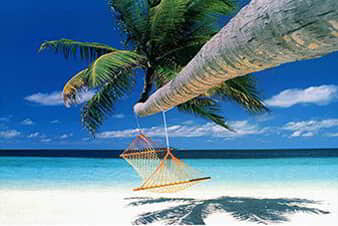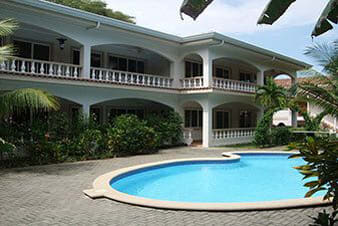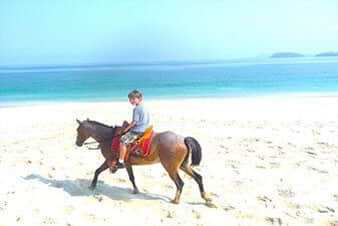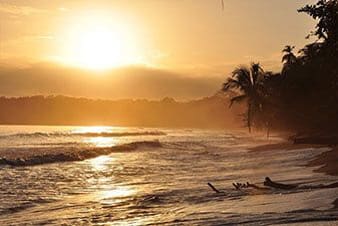INFORMATION ABOUT COSTA RICA AND RESIDENCY
Basic facts
Costa Rica has been named the happiest country in the world, and a paradise for peace and biodiversity. It is a Central American country that is home to incredible biodiversity, rich cultures, a passion for freedom, and a long history of democracy, equality, health care, and education for everyone. It is about slightly smaller than West Virginia and about the same size as Lake Michigan. There are more than eight hundred miles of coastline. The country is bordered in the north with Nicaragua, and in the south with Panama. The east borders on the Caribbean Sea, and the west on the Pacific Ocean. It lies within the tropics at just ten degrees north of the equator. Costa Rica has around two hundred volcanoes, and they are all inactive at the moment. Poas Volcano in has the second largest volcanic crater in the world. It is home to approximately five percent of the world's biodiversity, but only occupies around three tenths of one percent of the earth's surface.The U.S.A. is almost two hundred times larger than Costa Rica.
Language of Costa Rica
The official language is Spanish, but large parts of the populations also speak English, French, Italian, and Mandarin Chinese. English is widely spoken in most tourist areas and hotels, and English is taught to Costa Rican schools.
Passport requirement
A valid passport is mandatory to enter Costa Rica. It is also needed to drive a car along with a valid driver's license.
Credit card acceptance
All businesses, hotels, restaurants, and stores accept credit cards. Some do not accept American Express credit cards.
Cell phone
Your smart phone must be an unlocked quad band phone and it must use a removable SIM card. Most of the phones from Sprint and AT&T can be used.
Emergency number
In an emergency dial 911 or 112 for immediate assistance for ambulance, fire and police services.
Important holidays
Since Costa Rica is a Catholic country the most important holidays revolve around religion. Holy Week, known as Semanta Santa, is the week before Easter Sunday. Christmas, New Year's Day, Independence Day, and Mother's Day are very popular.
Typical food
The cuisine is mostly mild and savory while spicy food is uncommon. Traditional dishes use Latin American favorites of beans, rice, and local produce. Small neighbor diners, called sodas, serve generous portions of local meals, and are very economical. A full meal of food and a natural fruit drink is three to five dollars.
Sales tax
Costa Rica has a VAT tax of thirteen percent.
Tipping
Hotels, restaurants, fast food, and nightclubs are required to add a 13% sales tax and a 10% service charge on all bills, so tipping here is optional but appreciated.
Bringing your pet
Bringing a dog or a cat to Costa Rica is a relatively simple process. Dogs and cats are not subject to quarantine, provided you have the correct paperwork and vaccines. The required vaccinations are distemper, hepatitis, leptospirosis, parvovirus and rabies for animals 4 months or older. Birds, snakes, fish, horses, and other pets or agricultural animals are subject to additional restrictions.
Electricity
The voltage in the country is 110 V, the same as in North America. However, three-prong outlets are scarce so bring along an adapter if needed
Internet
Internet is very common throughout the country. Hotels, restaurants, and many stores provide free Wi-Fi service as well as many parks. Also local internet cafes offer high speed connections.
The currency of Costa Rica
It is the colón, named after the Spanish name of Christopher Columbus who discovered Costa Rica in 1502. The U.S. dollar is accepted by merchants around the country and some accept Euros.
Exchanging money
Money can be exchanged in all public and private banks. Your passport is required to exchange money at banks. Also, many places accept dollars.
Gas price
Regular unleaded gas costs about $5.00 a gallon. All gas stations in Costa Rica are full service and prices are set by the government so there is no need to shop around for a lower price.
Time zone
Costa Rica is on Central Standard Time, six hours behind Greenwich Mean Time. It does not use daylight saving time so it is always on standard time,
Length of stay
Citizens from most countries can stay for up to ninety days in Costa Rica. Citizens from some restricted countries are allowed to stay for a maximum of thirty days, but they can apply for an extension up to ninety days.
National parks
Costa Rica has over twenty-eight percent of its land area protected as either a national park or a wildlife reserve. This is the largest percentage of territory protected by any country in the world. Costa Rica has twenty-eight national parks in total, three of which are UNESCO World Heritage Sites.
Weather
It is a tropical country and experiences only two seasons, rainy and dry. The dry season is generally between November and April, and the rainy season is between May and October. The Caribbean coast tends to be humid all year. Temperatures vary little between seasons with the main difference of temperature is based on altitude.
Marriage in Costa Rica
Foreigners can get married in Costa Rica with very few requirements. You will need a copy of both birth certificates, a copy of any divorce decrees, two witnesses, and a lawyer to marry you.
Inoculations
The only one required is a yellow fever vaccination if you are coming from certain southern African countries as well as Venezuela, Brazil, Peru, Colombia, and Ecuador.



